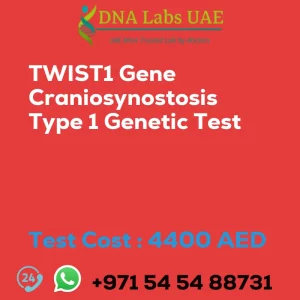SALL4 Gene Duane Retraction Syndrome Genetic Test
Welcome to DNA Labs UAE, where we offer the SALL4 Gene Duane Retraction Syndrome Genetic Test. In this blog, we will provide detailed information about the test, including its components, cost, symptoms, diagnosis process, and more.
Test Details
The SALL4 gene is associated with a rare genetic disorder called Duane Retraction Syndrome (DRS). DRS is characterized by limited eye movement and abnormal positioning of the eyes, usually affecting one or both eyes. It is a congenital disorder, meaning it is present from birth.
Next-generation sequencing (NGS) is a genetic testing technique that allows for the analysis of multiple genes simultaneously. In the case of DRS, NGS can be used to identify mutations or variations in the SALL4 gene that may be responsible for the disorder.
Components and Price
Our SALL4 Gene Duane Retraction Syndrome Genetic Test is priced at 4400.0 AED. The test requires a sample condition of blood or extracted DNA, or one drop of blood on an FTA Card.
Report Delivery and Method
The report delivery time for this test is approximately 3 to 4 weeks. We utilize NGS technology as the method for conducting the test.
Test Type and Doctor
The test falls under the category of dysmorphology and is conducted by our team of experienced pediatricians.
Test Department and Pre Test Information
The SALL4 Gene Duane Retraction Syndrome Genetic Test is conducted in our Genetics department. Before undergoing the test, it is important to provide the clinical history of the patient who is going for the test. Additionally, a genetic counseling session may be conducted to draw a pedigree chart of family members affected by SALL4 Gene Duane Retraction Syndrome.
Test Process
The genetic test for DRS using NGS involves obtaining a DNA sample, typically through a blood or saliva sample, from the individual being tested. The DNA is then sequenced using NGS technology to analyze the SALL4 gene and identify any potential mutations or variations.
Benefits and Availability
This genetic test can help confirm a diagnosis of DRS and provide valuable information for genetic counseling and family planning. It can also aid in understanding the underlying genetic mechanisms of the disorder.
It is important to note that genetic testing for DRS using NGS may not be available in all healthcare settings and may require specialized laboratories or genetic testing centers. We recommend consulting with a healthcare professional or genetic counselor to determine the availability and appropriateness of this test for individual cases.
| Test Name | SALL4 Gene Duane Retraction syndrome Genetic Test |
|---|---|
| Components | |
| Price | 4400.0 AED |
| Sample Condition | Blood or Extracted DNA or One drop Blood on FTA Card |
| Report Delivery | 3 to 4 Weeks |
| Method | NGS Technology |
| Test type | Dysmorphology |
| Doctor | Pediatrics |
| Test Department: | Genetics |
| Pre Test Information | Clinical History of Patient who is going for SALL4 Gene Duane Retraction syndrome NGS Genetic DNA Test. A Genetic Counselling session to draw a pedigree chart of family members affected with SALL4 Gene Duane Retraction syndrome NGS Genetic DNA Test gene SALL4 |
| Test Details |
The SALL4 gene is associated with a rare genetic disorder called Duane Retraction Syndrome (DRS). DRS is characterized by limited eye movement and abnormal positioning of the eyes, usually affecting one or both eyes. It is a congenital disorder, meaning it is present from birth. Next-generation sequencing (NGS) is a genetic testing technique that allows for the analysis of multiple genes simultaneously. In the case of DRS, NGS can be used to identify mutations or variations in the SALL4 gene that may be responsible for the disorder. A genetic test for DRS using NGS involves obtaining a DNA sample, typically through a blood or saliva sample, from the individual being tested. The DNA is then sequenced using NGS technology to analyze the SALL4 gene and identify any potential mutations or variations. This genetic test can help confirm a diagnosis of DRS and provide valuable information for genetic counseling and family planning. It can also aid in understanding the underlying genetic mechanisms of the disorder. It is important to note that genetic testing for DRS using NGS may not be available in all healthcare settings and may require specialized laboratories or genetic testing centers. It is recommended to consult with a healthcare professional or genetic counselor to determine the availability and appropriateness of this test for individual cases. |








